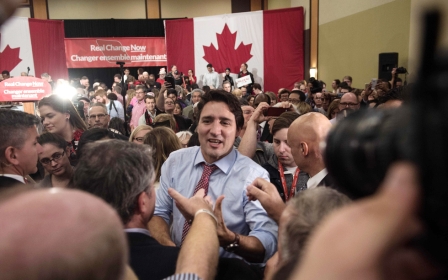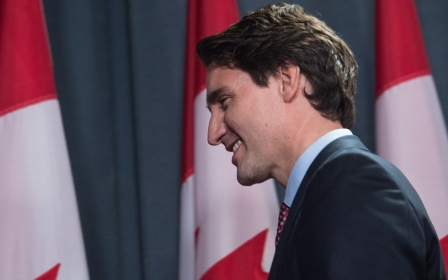Canada turns away from neoconservative foreign policy

On 8 September, 2012, Canada’s Prime Minister Stephen Harper and his Foreign Minister John Baird participated in an Asia Pacific Co-operation (APEC) summit in Vladivostok. During the summit, Baird held a news conference to make an announcement. While the announcement was largely irrelevant to the summit, it promptly topped headlines and resonated throughout the world: Canada had severed its relations with Iran.
The statement was nearly unprecedented because such moves are ordinarily reserved for only the most severe conditions.
Baird listed a host of reasons that prompted the decision. According to Baird, the primary impetus for the decision was the extant concern “for the safety of the men and women working at the Canadian mission”. He cited the attack on the British Embassy in Tehran as evidence that Canada’s diplomats were in danger in Tehran. The UK embassy, however, was stormed nearly a year before in November 2011. Moreover, the British Deputy Prime Minister Nick Clegg told the BBC in the immediate aftermath of the incident that a UK response would not include “cutting off all diplomatic relations with Iran”. The question then became why Canada, rather than the UK, chose to sever relations with Tehran.
Moreover, Canada’s 2012 decision was contrary to their diplomatic handling of the seizure of the American Embassy in 1979, when they aided six American diplomats in escaping from Iran. Cutting ties with Iran may have then been justified, due to a frenzied revolutionary atmosphere that posed a serious safety risk to Canadian staff. But Canada chose not to sever diplomatic relations with Iran.
Baird also noted other motivations Canada had in severing ties with the Iranian government, including human rights violations by that government. But if human rights violations were a genuine motive behind the decision, relations with Iran should have been cut years before, when tension between the two countries peaked over the tragic death of Ms Zahra Kazemi. Kazemi, a journalist with dual Canadian-Iranian citizenship, was suspiciously killed while in Iran’s custody in 2003.
Canada, the peacekeeper, tilts to the right
From the 1950s - when Lester Pearson, a Nobel Peace Prize Laureate, became the Secretary of State for External Affairs (later the Canadian prime minister) - until 2003, Canada’s foreign policy was predominantly characterised by supporting peace and peacekeeping. In 2003, after the Liberal leader Paul Martin succeeded Jean Chretien, Canada’s foreign policy tilted toward the right. The move was motivated by Canada’s desire to become a legitimate global policy player. The foreign policy shift toward the right was complete when Stephen Harper, the leader of the newly constituted conservative party became Canada’s prime minister in February 2006.
During Jean Chretien’s tenure as a Liberal prime minister, Harper criticised him, saying, “Downright hostility to the United States, anti-Americanism, has come to characterise other dimensions of Canadian policy.” Against the 71 percent of Canadians who supported the Chretien administration’s decision to stay out of the Iraq war, Harper attacked the Liberal government as “gutless and juvenile”. Harper relentlessly sought to open a Canadian branch of American neo-conservatism in Ottawa.
Another development in Canada’s foreign policy during Harper’s tenure was the transformation of the country’s policy toward Israel. In 2009, the Toronto Star, Canada’s most-read newspaper, reported that “Canada stood alone before a United Nations human rights council [as] ... the only one among 47 nations to oppose a motion condemning the Israeli military offensive in Gaza”. The Toronto Star also wrote that “observers say Ottawa's unwavering support of Israel in the current conflict ... is a break from more neutral positions of the past”.
In October 2010, Canada lost to Portugal in a vote for a seat on the UN Security Council. Observers attributed Canada’s loss to its pro-Israel policy at the UN. Reacting to his critics, Harper maintained, “as long as I am prime minister, whether it is at the UN or the Francophonie or anywhere else, Canada will take that stand, whatever the cost”.
In January 2014, Harper became the first Canadian prime minister to address the Israeli Knesset. In that gathering he passionately pledged that “through fire and water, Canada will stand with you”.
The 2012 severance of relations with Tehran was understandable in the context of this worldview.
Justin Trudeau turns back the clock
The 19 October Canadian elections resulted in Israel losing its “best friend”. The 43-year-old Justin Trudeau led Canada’s centre-left Liberal party to a sweeping victory after the nation’s longest election campaign since 1872. Unexpectedly, the Liberals gained a clear majority in Parliament. Trudeau has announced that he will depart from his predecessor by seeking to shift Canada’s foreign policy to its traditional format - i.e., the dominance of soft power over hard power.
Three significant changes are already noticeable. Trudeau is determined to restore Canada’s relations with Iran, end the era of Canada’s special relationship with Israel, and withdraw from the American-led combat mission against ISIS. The latter signals the most dramatic shift in Canada’s foreign policy. The move has been interpreted as an informal announcement of the end of following US policies with no regard for Canada’s national interest or its traditional, peace-seeking, and globally known political value system.
Ottawa versus Washington?
Each of the latest polls regarding the 2016 US presidential nominations indicate that Hillary Clinton is ahead of the other candidates by a large margin. Despite her support, albeit tepid, of the Iranian nuclear agreement, Clinton is known as being hostile to the Iranian government and pro-Israel, boasting of an adversarial relationship with Iran.
Assuming an absence of drama in the 2016 US elections – based on the polls Bernie Sanders, the left-leaning Democrat candidate, is projected to fail to secure a victory in the Democrat primaries – the next US president, be it Clinton or a Republican, will most likely take a pro-Israel approach and a tough stance toward Tehran. This being the case, a confrontation between Washington and Ottawa is likely. Such a clash would mirror the tense relations between Jean Chretien and George W Bush surrounding the aftermath of 9/11, when Canada rejected participation in the US-led invasion of Iraq.
It could be argued that Canada’s foreign policy shift may not positively impact Iran, given that Canada is not a major global policy player. While there is an element of truth to this argument, it should not be forgotten that Canada is a G7 member.
Given the fact that the nuclear deal and the lifting of international sanctions on Iran has triggered a stampede of European companies paving a path to Tehran to secure contracts, it is expected that Europe will likely depart from its confrontational policies pursued in the previous decade.
Should that occur, the alliance between Canada and Europe will isolate the US, should Washington choose to adopt tough policies against Tehran. Such an approach to Iran would make it difficult for the US to implement its desired policies because without Canada’s backing of the US, the situation would no longer pit North America against Europe. As a result, the US would have little room for manoeuvre.
- Shahir Shahidsaless is a political analyst and freelance journalist writing primarily about Iranian domestic and foreign affairs. He is also the co-author of “Iran and the United States: An Insider’s View on the Failed Past and the Road to Peace”.
The views expressed in this article belong to the author and do not necessarily reflect the editorial policy of Middle East Eye.
Image: Canadian Prime Minister Justin Trudeau speaks at a press conference at Rideau Hall after being sworn in as Canada's 23rd Prime Minister in Ottawa, Ontario, November 4, 2015. (AFP)
New MEE newsletter: Jerusalem Dispatch
Sign up to get the latest insights and analysis on Israel-Palestine, alongside Turkey Unpacked and other MEE newsletters
Middle East Eye delivers independent and unrivalled coverage and analysis of the Middle East, North Africa and beyond. To learn more about republishing this content and the associated fees, please fill out this form. More about MEE can be found here.





